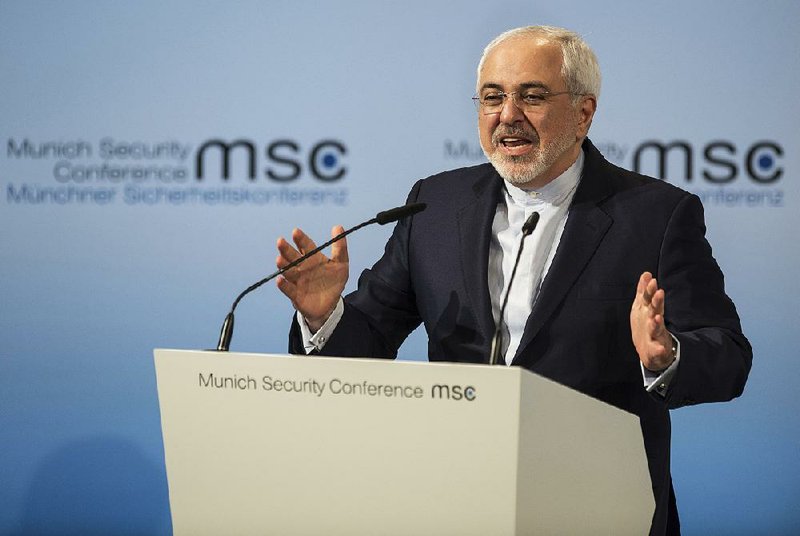MUNICH -- Iran's foreign minister on Sunday brushed aside recent pressure from the United States, declaring at the Munich Security Conference that his country is unmoved by threats but responds well to respect.
President Donald Trump has repeatedly criticized the 2015 nuclear agreement reached by Iran, the U.S. and five other countries, under which Tehran agreed to curb its uranium enrichment in exchange for the lifting of international sanctions. But Trump hasn't said what he plans to do about it.
His administration has said Iran is "on notice" over a recent ballistic missile test, and the U.S. imposed new sanctions on more than two dozen Iranian companies and individuals.
"Iran doesn't respond well to threats," Foreign Minister Mohammad Javad Zarif said at the Munich conference, an annual gathering of top diplomats and defense officials. "We don't respond well to coercion. We don't respond well to sanctions, but we respond very well to mutual respect. We respond very well to arrangements to reach mutually acceptable scenarios."
[PRESIDENT TRUMP: Timeline, appointments, executive orders + guide to actions in first 100 days]
Iran has consistently said it has no interest in nuclear weapons. Asked how long it would take to make one if it did decide it wanted such weapons, Zarif replied: "We are not going to produce nuclear weapons, period. So it will take forever for Iran to produce nuclear weapons."
Saudi Arabia's foreign minister, Adel al-Jubeir, argued that the Iranians "stepped up the tempo of their mischief" during the negotiations on the nuclear deal and have continued to do so since then.
Expressing optimism about the Trump administration, al-Jubeir said Saudi Arabia sees "a president who's pragmatic and practical, a businessman, problem solver, a man who's not an ideologue. ... He wants America to play a role in the world. Our view is that when America disengages, it creates tremendous danger in the worlds, because it leaves vacuums."
U.S. Sen. Lindsey Graham, R-S.C., said Iran has tried to build a nuclear weapon, adding that "if they say they haven't, they're lying."
He proposed new sanctions in Iran for various reasons, including for what he said were violations of United Nations resolutions and efforts to destabilize the Mideast.
"I think it is now time for the Congress to take Iran on directly," he said. "I think most Republicans are on board with that concept, and we'll see where President Trump's at."
Graham also on Sunday called for Trump to make a clear statement that Russia must pay a price for interfering with the U.S. presidential election. A Senate bill to sanction Russia is likely to get more than 75 votes, he said at the conference, adding that Trump should sign it.
This year "is going to be a year of kicking Russia in the ass in Congress," Graham said. "If you're worried that we're not going to look long and hard at what Russia did in our election because Trump won and Republicans are in charge, you don't need to worry about that. We are. Because if we don't, it could be the Chinese or Iranians next, it could be the Republicans [who are targeted] next time."
In remarks at the conference Saturday, Russian Foreign Minister Sergey Lavrov pushed back against the accusations of Russian meddling, saying no one had put forward any proof. "Somehow when we are blamed, no one asked for facts," Lavrov said. "Give us some facts."
On a separate topic, Graham said the Republican-led Congress has an opportunity to unite around action against China.
"There's bipartisan support to declare China a currency manipulator," Graham said. "I don't want a war with China; I want a better relationship. But what they're doing needs to be pushed back against -- and I think currency manipulation will be an issue that may unite the Congress."
Graham's stance was backed by Sen. Jeanne Shaheen of New Hampshire, a Democrat who was part of the U.S.' conference delegation.
While the U.S. has long accused China of undervaluing its currency to boost exports, Beijing actually has been leaning substantially on foreign reserves to support the yuan amid an economic slowdown. The yuan gained 0.9 percent against the dollar in January, its biggest advance since March, after sinking 13 percent in the three years through 2016.
Trump this month recommitted the U.S. to the one-China policy that has underpinned the two nations' relations since the 1970s, backing off a threat, made before his inauguration in January, to abandon a stance that acknowledges that China and Taiwan are part of the same country.
Information for this article was contributed by David Rising and Geir Moulson of The Associated Press and by Patrick Donahue, Nick Wadhams and Richard Miller of Bloomberg News.
A Section on 02/20/2017
